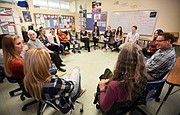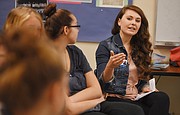Nursing students study high school stress levels
Stress is on the rise among American teens who sometimes struggle to balance school, home life and social expectations. Teens today report higher levels of stress than adults and more than a third anticipate their stress levels to only increase next year.
This upswing of teenage stress prompted one group of Montana State University nursing students to take action. For their psychology of nursing course, four prospective nurses at the school’s Kalispell campus were tasked with creating a mental-health project with an educational component. The team of Lauren England, Walter Kenyon, Andrew Baker and Tailyr Dyrdahl were the first from the university to actually reach out to the community in the process.
England said the group identified stress as a major factor in their own lives, though the high school population may be at an even higher risk given expectations of today’s society where students are encouraged to participate in extra-curriculars alongside academics, all while preparing for college.
In early October, the group met with Besty Funk’s classes at Columbia Falls High School and issued an anonymous survey to gather data about the students’ stress levels, coping mechanisms and contributing factors. The school recently made headlines as the primary target of cyber threats that escalated when the hackers breached the school’s servers and sent threatening text messages to select families and teachers in September. Kenyon said his group had already selected the school prior to the threats.
The survey posed questions such as: on a scale of 1 to 10, how would you classify your stress? Have you used illegal substances to cope with stress? Do stressors at home carry into your academic life?
In late October, the nursing students met with Funk’s classes to discuss their findings and strategies for stress management.
The Columbia Falls students reported an average stress rating of 5.8 — identical to the national average for their age group, yet also higher than the adult average rating of 5.1.
“Adults don’t really think about what kids are really stressed about,” Kenyon said. “Kids are in the background, but they’re hearing everything that you’re talking about and they’re taking that in. If you’re watching the news, they’re listening — and that’s stressful.”
Among the top stressors listed by high school respondents were school, getting good grades, preparing for college and extra-curriculars, with family life rounding out the top five.
“I think being able to manage stress for these kids, or for anyone, is key to long-term wellness,” Funk said. “They loved having those students here to work with them. They felt better and more relaxed and more focused on their work for a couple weeks, it was great.”
England taught the class a relaxation technique where an individual focuses their attention on a single word, relaxes, closes their eyes and breathes slowly to help calm them down. Baker told students about the importance of being mindful and focusing on each of the five senses as a way to destress and stay in the moment.
And finally, they talked about the word “no” — and why it’s OK to say it and be guilt-free in doing so.
“The culture of over-scheduling is definitely prominent in our society and it’s glorified to be crazy-busy,” England said.
“How to say no is huge,” Kenyon added. “We all need more work with saying no. You don’t need to make excuses for why we don’t want to do something and we don’t need to feel guilty about it.”
When asked why the group decided to venture into the community rather than execute a primarily research-based project, England said the outreach they conducted was also a part of nursing.
“A major role aspect of a nurse is education and it just felt applicable to start using that part of our future career,” she said.
“It’s nice to give back … it’s just part of where we’re going,” Kenyon said, “And who we’re going to be in the community, so why not start now?”
Reporter Mackenzie Reiss may be reached at 758-4433 or mreiss@dailyinterlake.com.






